Alexander Todd - A Time to Remember
Здесь есть возможность читать онлайн «Alexander Todd - A Time to Remember» весь текст электронной книги совершенно бесплатно (целиком полную версию без сокращений). В некоторых случаях можно слушать аудио, скачать через торрент в формате fb2 и присутствует краткое содержание. Город: Cambridge, Год выпуска: 1983, ISBN: 1983, Издательство: Cambridge University Press, Жанр: Химия, Биографии и Мемуары, на английском языке. Описание произведения, (предисловие) а так же отзывы посетителей доступны на портале библиотеки ЛибКат.
- Название:A Time to Remember
- Автор:
- Издательство:Cambridge University Press
- Жанр:
- Год:1983
- Город:Cambridge
- ISBN:0 521 25593 7
- Рейтинг книги:3 / 5. Голосов: 1
-
Избранное:Добавить в избранное
- Отзывы:
-
Ваша оценка:
- 60
- 1
- 2
- 3
- 4
- 5
A Time to Remember: краткое содержание, описание и аннотация
Предлагаем к чтению аннотацию, описание, краткое содержание или предисловие (зависит от того, что написал сам автор книги «A Time to Remember»). Если вы не нашли необходимую информацию о книге — напишите в комментариях, мы постараемся отыскать её.
A Time to Remember — читать онлайн бесплатно полную книгу (весь текст) целиком
Ниже представлен текст книги, разбитый по страницам. Система сохранения места последней прочитанной страницы, позволяет с удобством читать онлайн бесплатно книгу «A Time to Remember», без необходимости каждый раз заново искать на чём Вы остановились. Поставьте закладку, и сможете в любой момент перейти на страницу, на которой закончили чтение.
Интервал:
Закладка:
Within a month or two of my having turned down the offer of Hopkins' chair I was visited in Wilmslow by J. T. Saunders, Secretary General of the Faculties and the real head of the academic administration in Cambridge. He was sent up to talk to me, in strict confidence, about the general situation of chemistry in Cambridge, and to explore the kind of conditions I might wish to lay down if officially approached to take the organic chemistry chair. Some of the problems which beset chemistry in Cambridge I already knew and others I suspected. W. J. Pope had been head of a department which embraced not only organic but also physical and inorganic chemistry. As far as I knew - and this was broadly confirmed by Saunders - Pope had ruled his colleagues with a rod of iron and, during the last part of his life, had made matters worse by ceasing to take much interest in chemistry and becoming almost a recluse. There was a long history of internecine warfare between R. G. W. Norrish who was Professor of Physical Chemistry and E. K. Rideal who, although also running what was in effect a second school of physical chemistry, did so under the banner of Colloid Science. Furthermore, the chair intended for inorganic chemistry had been diverted into one entitled Theoretical Chemistry which was occupied by J. E. Lennard Jones whose interests were mathematical rather than chemical, and who had no contact at all with inorganic chemistry, important though that subject was (or should have been) in undergraduate teaching. Not surprisingly perhaps, Norrish was determined that he would not be at the beck and call of another Pope, while neither Lennard Jones nor Hamilton McCombie (Reader in Chemistry who was acting as a kind of caretaker of the organic laboratories) would contemplate being subservient to Norrish; I understood from Saunders that the department was being run (not very efficiently) by a committee of these three men, although Lennard Jones was absent as a temporary civil servant with the Ministry of Supply during most of the war. In the main chemical laboratory (physical chemistry was housed in a separate but adjacent building with a connecting passageway) things were at a low ebb. Pope had ceased to take any active interest in his subject, stereochemistry, several years before his death, and command of the laboratory had passed to W. H. Mills, a somewhat narrow stereochemist of a rather sour and, to young men at least, forbidding disposition who discouraged all but his own rather limited field of work. Mills had retired during the war leaving, as senior organic chemist, F. G. Mann, a university lecturer and Fellow of Trinity. Mann had come from London to Cambridge in 1919 to be research assistant to Pope, and had remained in Cambridge ever since. He certainly had a hard life under Pope and Mills and, by the time Mills left, he had more or less shut himself off with a few research students pursuing his own work, which was also stereochemical like that of his mentors; his interests lay largely in the stereochemistry of co-ordination compounds of metals on the one hand, and heterocyclic derivatives of phosphorus and arsenic on the other. Mann was a first-class chemist but much embittered by his experiences in Cambridge, and by the fact that his interests lay in areas that had become unfashionable and in some respects sterile. He did little to hold the department together, and the task of keeping it afloat had passed to the amiable, although chemically rather ineffective, Hamilton McCombie. The latter had at least taken some action about inorganic chemistry by arranging that H. J. Emeleus, then a reader in Imperial College London, should come down each year and deliver a course of lectures to the Cambridge undergraduates.
Having heard what Saunders had to say I told him that I did not think a chemistry department could be run by a committee and that I could not accept such a proposition, but I agreed to his request that I should come to Cambridge, meet with the resident electors to the chair, and give them my considered views after looking over the laboratories.
In due course I was formally invited to go to Cambridge for this purpose, but meanwhile Alison and I debated again and again the question of moving, and my correspondence on the matter with Robert Robinson on chemical matters, and Alison's father on Cambridge and on diplomatic aspects, grew apace. Throughout all our discussion on Cambridge Sir Henry was a great help, for he was an immensely wise as well as a kindly man. The academic grapevine is, of course, very efficient, and by now the possibility that I might move to Cambridge was being widely, if not openly, discussed in Manchester and particularly, of course, in the chemistry department. I gathered that quite a few members of my research school were minded to accompany me to Cambridge if I went, and Ralph Gilson told me quite openly that if I moved to Cambridge without him he would leave university work altogether and take up some other career. While all this was flattering, it was also just a little alarming, since it looked as if there might be a mass exodus in the event of my deciding to move.
When I went to see the Cambridge electors I first had a good look at the University Chemical Laboratory in Pembroke Street with McCombie (whom I had come to know through his association with Chemical Defence) as my guide. When I saw it my heart sank; it was quite dreadful. To begin with, the main part of the building dated from 1886 and, unlike the Manchester laboratory, it had been poorly maintained; one block had been added after the First World War on the strength of a substantial endowment from the Anglo-Persian Oil Company; but the new building was built on the cheap according to ideas of design already out of date, while the university, in effect, channelled the rest of the endowment into general university funds. Even in this newest block, the laboratories were lit by gas although obviously gas brackets on the laboratory benches represented an appalling fire hazard. On enquiring how this had come about, I was given a fantastic explanation the gist of which was that determination of the end-point in volumetric analysis by titration was more accurate by gaslight than electric light! I could not help wondering whether greater significance might not have been attached to the fact that, according to my informants, since the Cambridge Gas Company had come into existence successive professors of chemistry in Cambridge had been members of its board of directors. The level of equipment was very low and what there was was mostly antiquated. There appeared to be no coherent organisation at all, administration being in the hands of a well-meaning and, within his limitations, able enough senior laboratory assistant, Charles Lister, who had joined the laboratory staff at the age of fourteen and was now coming towards retirement. The academic staff rode roughshod over Charlie and, as a result, the whole place consisted of small virtually autonomous units, each run for his own benefit by a member of staff. I suppose they had little choice, but it was clear enough that this system of operation led to gross waste and inefficiency; as a result of it, no-one had the faintest idea of the total amount, or even the whereabouts, of chemicals and apparatus in stock. At the time of my inspection only a small amount of space was occupied by F. G. Mann's stereochemical work and an equally small part by B. C. Saunders, who had temporarily given up his work on the mechanism of peroxidase action and was doing some first-class research on organophosphorus compounds for the Chemical Defence section of the Ministry of Supply. The remainder was occupied by (a) Queen Mary College, (b) St Bartholomew's Hospital Medical School, and (c) a small group carrying out work on the separation of uranium isotopes for the atomic bomb project.
I really was appalled by what I saw and at first felt I should withdraw at once. A little reflection indicated, however, that if I could get rid of the three groups of squatters mentioned above, have some money to change lighting and equip the laboratories to modern standards, and set up a proper administrative organisation, the place had great potential. Moreover, the school was so run down that I was unlikely to meet with any serious opposition when I started to put it in order. Having come to this conclusion I then confronted the Cambridge electors and the Secretary General of the Faculties. I had to begin by telling them there wasn't a great deal to attract a newcomer, the Cambridge school being currently one of the weakest in Britain and the University Chemical Laboratory a disgrace to any university. Indeed, I seem to remember suggesting to the chairman that given a stuffed crocodile to hang from the roof, the professor's private laboratory could be more appropriately located in the Museum of the History of Science, which was one of the projects being discussed in the university at that time. I must confess that the electors took it very calmly, and did not appear to disagree with me; they asked me under what conditions I would consider appointment and I gave them the following:
Читать дальшеИнтервал:
Закладка:
Похожие книги на «A Time to Remember»
Представляем Вашему вниманию похожие книги на «A Time to Remember» списком для выбора. Мы отобрали схожую по названию и смыслу литературу в надежде предоставить читателям больше вариантов отыскать новые, интересные, ещё непрочитанные произведения.
Обсуждение, отзывы о книге «A Time to Remember» и просто собственные мнения читателей. Оставьте ваши комментарии, напишите, что Вы думаете о произведении, его смысле или главных героях. Укажите что конкретно понравилось, а что нет, и почему Вы так считаете.










